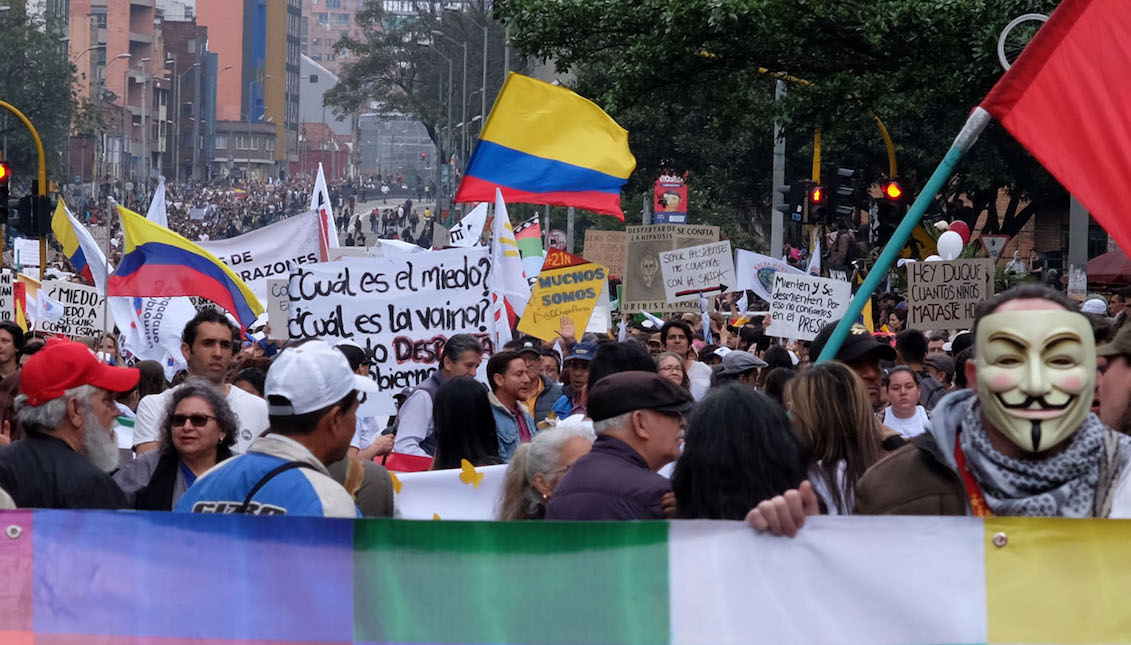
A brief summary of the National Strike in Colombia
Widespread discontent against the government of Ivan Duque in Colombia has turned into another major protest in Latin America.
After Bolivia and Chile, Colombia is now the epicenter of the social unrest that is boiling across the continent - and the world.
The rejection of President Ivan Duque's government reached the point of collapse last Thursday when hundreds of thousands of people took to the streets of Bogotá, Cali, Medellín, Bucaramanga, Barranquilla, and Cartagena, as well as several locations in the interior of the country.
The economic and social policies of the Duque government have been the last straw in a country plunged into violence and inequality for decades.
Social organizations throughout Colombia called for a national strike on November 21, arguing the effect of the government's "neoliberal" policies and the resurgence of violence in the country.
According to the main workers and university centers in a press conference, Colombia is tired of social inequality and diplomatic failures after the 2016 peace agreement with the guerrillas.
Only a year and a half after taking power, President Duque's approval has plummeted thanks to the accentuation of the country's poverty and corruption index, which the World Bank ranks as the second most unequal country in Latin America, despite a period of oil bonanza.
The spark that ignited the social revolts was the fire in the mayor's office in the city of Nechí, Antioquia, on October 28 after the 2019 regional elections, where the population claimed alleged fraud in favor of Marcos Javier Madera Camero.
However, since Duque came to power, indigenous and social leaders have been victims of a wave of murders, especially in the department of Cauca, according to the BBC.
Although a peace pact has been signed with the Colombian guerrillas, the mountainous region is the focus of a "spiral of violence" sponsored by armed groups, FARC dissidents, paramilitaries and drug gangs.
RELATED CONTENT
One of the key points of the peace process carried out by former President Santos contemplated "the gradual and voluntary substitution of illicit crops for other subsistence alternatives for the poorest communities," the media explains, and the lack of compliance "is contributing to the insecurity crisis that the indigenous population is experiencing in the country.”
As explained by the National Union School, the demands of the national strike are mainly focused against the labor reforms of the Duque government that include the reduction of the minimum wage for young people, the elimination of the pension as a right of workers, the privatization of the main companies of the country and the increase of energy tariffs by 35%, among others.
In addition, the country demands a minimum wage "that allows for a dignified life" and respect for the right to protest.
A tired people who will not give in
Duque's government has insisted on being a government that “listens.” However, street protests have resulted in more than 200 injuries, 98 arrests, and dozens of videos on social media showing excessive violence by law enforcement officials.
Video #ElParoSigue En estos momentos fuertes disturbios en el Portal Américas. A quemarropa agente del Esmad le dispara a ciudadano. #ParoNacional pic.twitter.com/U07JOlSy9K
— Las2orillas (@Las2Orillas) November 22, 2019
On November 21 alone, three people lost their lives.
In cities like Cali and Bogotá, the government decreed a curfew, the closing of borders, and has accused protesters of transforming the right to protest into acts of violence.
The citizens' response was to organize massive "pots and pans" across the country over the weekend, defying curfew and standing in front of the president's residence.
Cacerolazo 85 15 #ParoNacional pic.twitter.com/QSmfbcurns
— no mushrooms (@nosupermario) November 24, 2019











LEAVE A COMMENT: